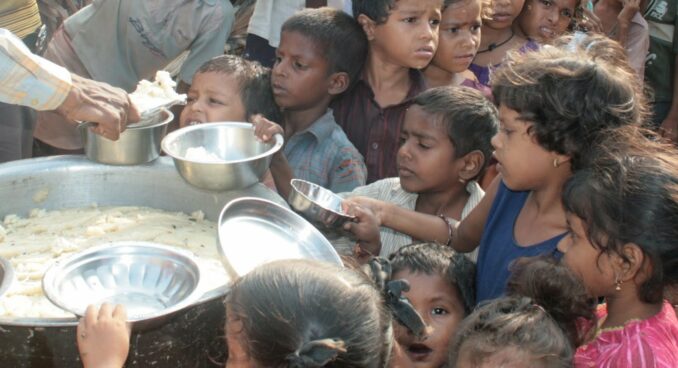World hunger and the war in Ukraine
During this war on Ukraine, No Cold War launched a new publication called Briefings, which will be factual texts on matters of global concern. Tricontinental: Institute for Social Research shared this first briefing:

Billions of people around the world will suffer from this hunger crisis.
The war in Ukraine, along with sanctions imposed by the United States and Western countries against Russia, have caused global food, fertilizer and fuel prices to skyrocket and endanger the world food supply. This conflict is exacerbating the existing crisis of global hunger and imperils the living standards and well-being of billions of people — particularly in the Global South.
War in the “breadbasket of the world”
Russia and Ukraine together produce nearly 30% of the world’s wheat and roughly 12% of its total calories. Over the past five years, they have accounted for 17% of the world’s corn, 32% of barley (a critical source of animal feed) and 75% of sunflower oil (an important cooking oil in many countries). On top of this, Russia is the world’s largest supplier of fertilizers and natural gas (a key component in fertilizer production), accounting for 15% of the global trade of nitrogenous fertilizers, 17% of potash fertilizers, 20% of natural gas. (tinyurl.com/t55eefmw)
The current crisis threatens to cause a global food shortage. The United Nations has estimated that up to 30% of Ukrainian farmland could become a warzone; in addition, due to sanctions, Russia has been severely restricted in exporting food, fertilizer and fuel. This has caused global prices to surge. Since the war began, wheat prices have increased by 21%, barley by 33% and some fertilizers by 40%. (tinyurl.com/t55eefmw)
The Global South is ‘getting pummelled’
The painful impact of this shock is being felt by people around the world, but most sharply in the Global South. “In a word, developing countries are getting pummelled,” United Nations Secretary-General António Guterres recently remarked. (tinyurl.com/2p98skfb)
According to the U.N., 45 African and “least developed” countries import at least a third of their wheat from these two, Russia or Ukraine — 18 of those countries import at least 50%. Egypt, the world’s largest wheat importer, obtains over 70% of its imports from Russia and Ukraine, while Turkey obtains over 80%.
Countries of the Global South are already facing severe price shocks and shortages, impacting both consumption and production. In Kenya, bread prices have risen by 40% in some areas and, in Lebanon, by 70%. Meanwhile, Brazil, the world’s largest producer of soybeans, is facing a major reduction in crop yields. The country purchases close to half of its potash fertilizer from Russia and neighboring Belarus (which is also being sanctioned) — it has only a three-month supply remaining, with farmers being instructed to ration.
“The United States has sanctioned the whole world”
The situation is being directly exacerbated by U.S. and Western sanctions against Russia. Although sanctions have been justified as targeting Russian government leaders and elites, such measures hurt all people, particularly vulnerable groups, and are having global ramifications. (U.N. News, Dec. 8, 2021)
Nooruddin Zaker Ahmadi, director of an Afghan import company, made the following diagnosis: “The United States thinks it has only sanctioned Russia and its banks. But the United States has sanctioned the whole world.” (tinyurl.com/t55eefmw)
“A catastrophe on top of a catastrophe”
The war in Ukraine and associated sanctions are exacerbating the already existing crisis of world hunger. The U.N.’s Food and Agriculture Organization found that “nearly one in three people in the world (2.37 billion) did not have access to adequate food in 2020.” (tinyurl.com/3r325ej5) In recent years, the situation has worsened as food prices have risen due largely to the COVID-19 pandemic, climate change and related disruptions.
“Ukraine has only compounded a catastrophe on top of a catastrophe,” said David M. Beasley, the executive director of the U.N. World Food Program. ‘“There is no precedent even close to this since World War II.” (tinyurl.com/t55eefmw)
“If you think we’ve got hell on earth now, you just get ready,” Beasley warned.
Regardless of the different opinions on Ukraine, it is clear that billions of people around the world will suffer from this hunger crisis until the war and sanctions come to an end.
In 1962, the Polish poet Wisława Szymborska wrote “Starvation Camp Near Jasło.” Located in southeast Poland not far from the Ukraine-Poland border, Jasło was the site of a Nazi death camp, where thousands of people — mainly Jews — were caged and left to die of starvation. How does one write about such immense violence? Szymborska offered the following reflection:
“Write it down. Write it. With ordinary ink on ordinary paper; they weren’t given food, they all died of hunger. All. How many?
“It’s a large meadow. How much grass per head? Write down: I don’t know.
“History rounds off skeletons to zero. A thousand and one is still only a thousand.
“That one seems never to have existed: a fictitious fetus, an empty cradle, a primer opened for no one, air that laughs, cries, and grows, stairs for a void bounding out to the garden, no one’s spot in the ranks … Each death is an abomination, including the 300 children who die of malnutrition every hour of every day.”

